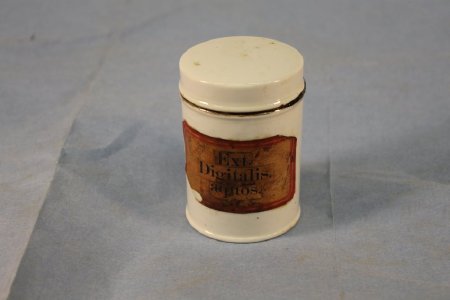Object ID Number:
2017.000.068
Object Name:
digitalis aquous bottle
Manufactured from:
1800
Manufactured to:
1900
Description / History:
19th century white glazed ceramic jar of liquid extract of digitalis, one of the earliest medicines used for the treatment of heart failure
Additional Information:
In the late 1700's, William Withering, a British physician, conducted a scientific investigation into the therapeutic effects of digitalis (also known as the foxglove plant), focusing specifically on its effectiveness for the treatment of heart failure. Well before Withering's time, digitalis had been documented by the ancient Romans as an herbal remedy, and had been used for the treatment of heart defects in 10th Century Europe. However, after Withering's discovery that digitalis was effective at combatting heart failure in his patients, digitalis became one of the most widely used drugs in the 19th century, and was listed in the first addition of the Pharmacopeia of the United States, in 1820.
In 1957, chemists isolated digoxin, the active ingredient in the leaves of the digitalis plant. Today, digoxin is marketed under the trade names of Lanoxin, Digitek, and Lanoxicaps, for the treatment of various heart conditions, and is commonly prescribed for heart failure which other medicines fail to control. The use of digoxin remains controversial, however, due to its extremely high toxicity when used above the recommended dosage, and the questionable nature of its effects. In 1997, the Digitalis Investigation Group determined that digoxin did not reduce mortality in the long–term for patients with heart failure (in fact, in a subsequent study, in women, digoxin was shown to increase mortality due to heart–related conditions), although it was helpful to reduce hospitalizations and slow the worsening of heart failure, in the short term. However, in the wake of these studies, as of 2002, digoxin is still recommended by the American College of Cardiology and the American Heart Association for the treatment of patients with heart failure.
In 1957, chemists isolated digoxin, the active ingredient in the leaves of the digitalis plant. Today, digoxin is marketed under the trade names of Lanoxin, Digitek, and Lanoxicaps, for the treatment of various heart conditions, and is commonly prescribed for heart failure which other medicines fail to control. The use of digoxin remains controversial, however, due to its extremely high toxicity when used above the recommended dosage, and the questionable nature of its effects. In 1997, the Digitalis Investigation Group determined that digoxin did not reduce mortality in the long–term for patients with heart failure (in fact, in a subsequent study, in women, digoxin was shown to increase mortality due to heart–related conditions), although it was helpful to reduce hospitalizations and slow the worsening of heart failure, in the short term. However, in the wake of these studies, as of 2002, digoxin is still recommended by the American College of Cardiology and the American Heart Association for the treatment of patients with heart failure.
3D Image Information:
The 3 dimensional image can be viewed using Google Chrome, Safari, or Firefox browsers.
3 Dimentional Image:
